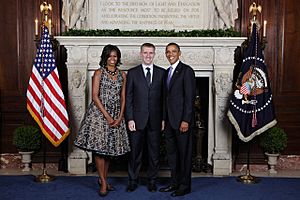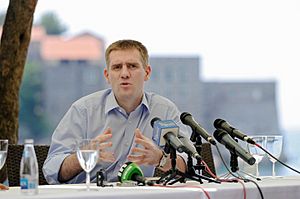Igor Lukšić facts for kids
Quick facts for kids
Igor Lukšić
|
|
|---|---|
|
Игор Лукшић
|
|
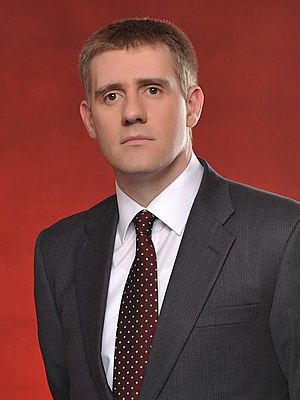
Official portrait, 2011
|
|
| Minister of Foreign Affairs | |
| In office 4 December 2012 – 28 November 2016 |
|
| Prime Minister | Milo Đukanović |
| Preceded by | Nebojša Kaluđerović |
| Succeeded by | Srđan Darmanović |
| Prime Minister of Montenegro | |
| In office 29 December 2010 – 4 December 2012 |
|
| President | Filip Vujanović |
| Preceded by | Milo Đukanović |
| Succeeded by | Milo Đukanović |
| Minister of Finance | |
| In office 16 February 2004 – 29 December 2010 |
|
| Prime Minister | Milo Đukanović Željko Šturanović Milo Đukanović |
| Personal details | |
| Born | 14 June 1976 Bar, SR Montenegro, SFR Yugoslavia (now Montenegro) |
| Political party | Independent |
| Other political affiliations |
Democratic Party of Socialists (2002–2016) |
| Alma mater | University of Montenegro |
| Occupation | Politician |
Igor Lukšić (born 14 June 1976) is a politician from Montenegro. He served as the country's fourth Prime Minister from 2010 to 2012. After his term as prime minister, he became the Minister of Foreign Affairs, a role he held until 2016.
As a politician, Lukšić worked to help Montenegro build stronger relationships with other countries. Today, he works for the company PwC, where he helps governments in southeast Europe.
Contents
Early Life and Education
Igor Lukšić was born in the city of Bar, which was then part of Yugoslavia. He grew up in a working-class family. His grandfather on his father's side was a train driver, and his grandfather on his mother's side was an army captain. His father was a marine engineer, and his mother worked for a shipping company.
When he was young, Lukšić thought about becoming a diplomat or a doctor. However, he decided to study economics at the University of Montenegro. He graduated in 1998 and continued his studies, earning a master's degree in 2002 and a PhD in 2005.
Besides his native Montenegrin language, he also speaks English fluently. Lukšić is married to his wife Natasha, and they have three children.
Political Career
Lukšić began his political career in 2001 when he was elected to the Parliament of Montenegro. He held several important positions before becoming a government minister.
Minister of Finance
In 2004, Lukšić became Montenegro's Minister of Finance. In this role, he was in charge of the country's money. During his time as minister, Montenegro's economy grew. He supported privatization, which means selling government-owned companies to private owners. He believed this would help create jobs and modernize the country.
In 2008, a global economic crisis affected countries around the world, including Montenegro. As Finance Minister, Lukšić had to find ways to manage the country's finances during this difficult time.
Becoming Prime Minister
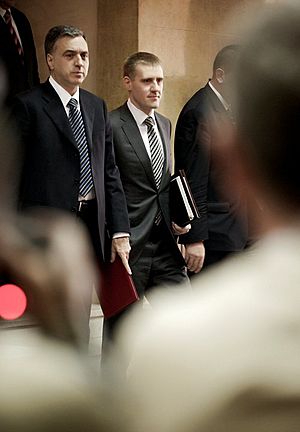
Lukšić was seen as a rising star in Montenegrin politics. In December 2010, Prime Minister Milo Đukanović resigned, and his party chose Lukšić to be the new prime minister. The Parliament of Montenegro officially approved him on December 29, 2010. At the time, he was one of the youngest prime ministers in the world.
As prime minister, Lukšić said he wanted to create a government with clear rules. One of his main goals was for Montenegro to join the European Union (EU) as quickly as possible. He believed that to achieve this, the country needed to make important changes and reforms.
He said in his first speech as prime minister: "The Government cannot and should not be the solution to all of society's problems... I will require everyone to be accountable for his part in the task, so that we all individually and jointly contribute to Montenegro’s overall development."
Prime Minister (2010–2012)
As prime minister, Lukšić focused on both foreign and domestic policy. He worked to strengthen Montenegro's position in the world while also making improvements at home.
Foreign Policy
Joining the European Union was Lukšić's top priority. His government worked closely with EU officials to begin the process of becoming a member. He also focused on security and cooperation with other countries. He supported Montenegro's goal of joining NATO, a military alliance of North American and European countries.
Under his leadership, Montenegro participated in international peacekeeping missions. These missions included operations in Afghanistan, off the coast of Somalia, and in Liberia.
Domestic Policy
Inside Montenegro, Lukšić tried to take a more open approach to politics. He met with opposition parties, non-governmental organizations (NGOs), and other groups to discuss important issues. His government also worked to fight crime and corruption. They made new laws and gave more power to groups responsible for tackling these problems.
One challenge his government faced was a disagreement over the official language. The government and opposition parties had to reach a compromise on what the language subject in schools should be called. They eventually agreed on the name "Montenegrin-Serbian, Bosnian, Croatian language and literature." This agreement helped the government move forward with other important reforms.
Later Career
After serving as prime minister, Lukšić became the Minister of Foreign Affairs from 2012 to 2016. In this role, he continued to work on Montenegro's goal of joining the EU and NATO.
Candidate for UN Secretary-General
In 2016, Lukšić was a candidate for the position of Secretary-General of the United Nations. This is the top job at the United Nations, an organization that works for world peace and cooperation.
During his campaign, he spoke about his vision for the UN. He emphasized the need for the UN to be accountable and to protect human rights. He was the first candidate to sign a pledge promising to address important human rights issues if elected.
Timeline of Political Offices
The chart below shows a timeline of the offices held by Lukšić and the status of Montenegro during that time.
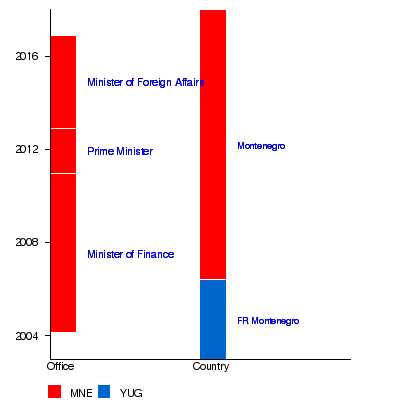
Images for kids
-
Lukšić with German Chancellor Angela Merkel on 31 March 2011.
-
Lukšić with U.S. Secretary of State Hillary Clinton in Washington, D.C., on 11 October 2011.
-
Igor Luksic at a panel discussion at the World Economic Forum in Vienna in June 2011.
See also
 In Spanish: Igor Lukšić para niños
In Spanish: Igor Lukšić para niños


